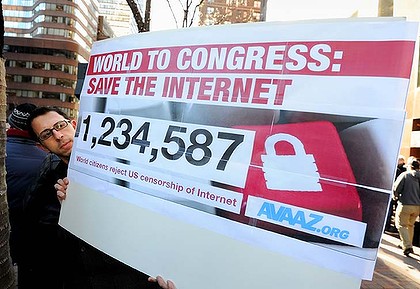Search
Democracy Links
Member's Off-site Blogs
our special friends ..... again .....

It is hard to know what was more surprising for the average online file-sharer - that sleepy New Zealand was home to the likes of Kim Dotcom, the corpulent magnate behind the Megaupload website; or that the FBI had hunted him halfway around the world and arrested him in the panic room of his $30 million mansion.
But we should be surprised on neither front. The US will go to the ends of the earth to protect its big entertainment corporations and Australia could be the scene of a bigger coup in coming months.
We can be a cowardly bunch, so scared of an unknown invader that we will sell our sovereignty for the illusion of protection. The Americans have no qualms about interfering in our domestic politics and local legal systems. The latest front in this meddling is the crossover between file-sharing and intellectual property.
Julian Assange has shone a sterilising light on the behaviour of the US embassy in Canberra. For his bravery, the Prime Minister, Julia Gillard, a lawyer, prejudiced any future legal action by labelling his actions "illegal". She has since demoted the Attorney-General whose job it was to give legal advice on the matter, but the damage has been done and the comment never retracted.
While the Gillard government was quick to shoot the messenger, it has remained eerily silent on the message - potential interference in domestic legal affairs by a so-called ally.
WikiLeaks revealed the US embassy sanctioned a conspiracy by Hollywood studios to target an Australian communications company through the local court system, with the aim of establishing a binding common law precedent that would make ISPs responsible for the unauthorised file-sharing of their customers.
Both the location, Australia, and the target, iiNet, were carefully selected. A precedent set in Australia would be influential in countries with comparable legal systems such as Canada, India, New Zealand and Britain. Telstra was judged too large. Owing to its more limited resources, iiNet was gauged the perfect candidate.
The involvement of major American studios in the offensive was suppressed. "The case was filed by ... the Motion Picture Association of America (MPAA) and its international affiliate, the Motion Picture Association (MPA), but does not want that fact to be broadcasted," the US embassy cable said. "We will monitor this case ... to see whether or not the 'AFACT vs. the local ISP' featured attraction spawns a 'giant American bullies vs. little Aussie battlers' sequel."
Gillard made her feelings towards America known when she addressed the US Congress last March and proclaimed, somewhat sycophantically, "You can do anything." This is not the diplomatic language of allies. It is the language of worship.
Many Australians believe we are special, reinforced by frequent utterings from successive US administrations that America "has no better friend" than Australia. Unfortunately, such a view is challenged by the even more frequent utterings that the US has no better friend than Canada, Britain, France, Italy, Israel, Japan, Poland and South Korea.
The "Australian" Federation Against Copyright Theft (AFACT), a consortium of American movie studios with token Australian representation, began legal action against iiNet in November 2008.
The MPA and US embassy badly misjudged their target. In tenacious Australian fashion, iiNet put up the legal fight of their lives. AFACT lost the case and all subsequent appeals.
Next month, the final episode of this long saga will culminate with a ruling of the High Court. But AFACT is already preparing for a loss in February by shifting its focus to lobbying the Australian government directly. The process began behind closed doors late last year when meetings were held between AFACT, linked copyright industry lobbyists, the federal Attorney-General's department and a coalition of Australian ISPs. The voting public has not been told what was discussed or what plans were developed.
If the High Court rules against AFACT and its Hollywood and US government backers, as every lower court has done thus far, Australia will be faced with a fresh test of national sovereignty. Only Australia's federal Parliament can overturn the decision.
With a Prime Minister visibly enamoured with the US and known informers present in the federal cabinet, there is a strong likelihood any win for iiNet will herald changes to Australian law. It is unlikely those changes will be friendly to an open file-sharing culture.
Glad-handing Government Dishing Us Up To US Copyright Bullies
- By John Richardson at 24 Jan 2012 - 8:25am
- John Richardson's blog
- Login or register to post comments
Recent comments
26 min 48 sec ago
1 hour 9 min ago
2 hours 7 min ago
4 hours 16 min ago
5 hours 43 min ago
20 hours 24 sec ago
19 hours 58 min ago
21 hours 8 sec ago
1 day 1 hour ago
1 day 4 hours ago